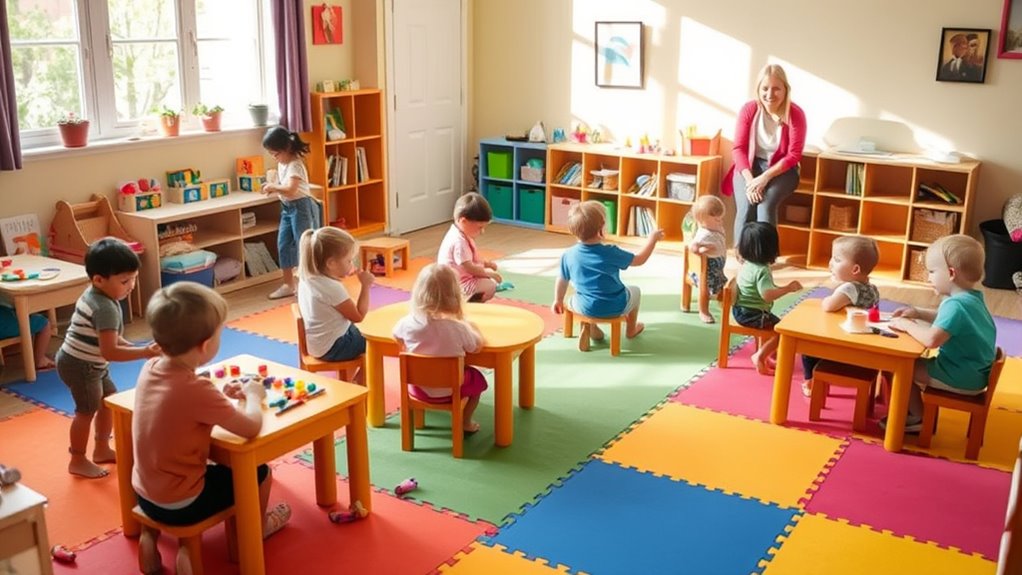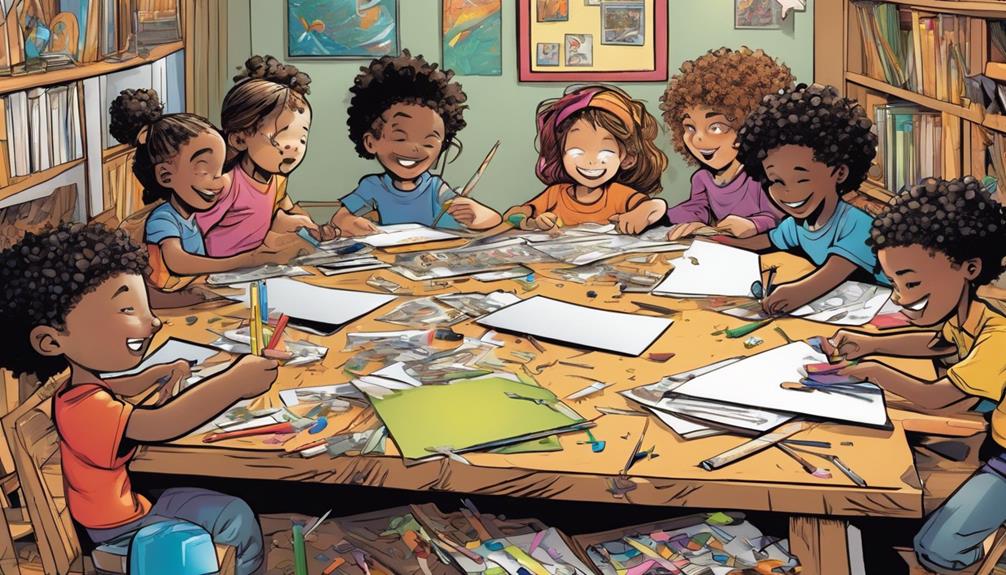To set up a mini co-op preschool at home, create a safe, organized space with accessible materials and designated activity zones. Plan simple, flexible activities like arts, counting games, and storytelling that match children’s interests and attention spans. Encourage parental involvement by sharing roles and supporting social skills through guided play. Establish routines and a warm atmosphere to foster curiosity and growth. Keep exploring further to discover how to turn your space into an engaging learning environment.
Key Takeaways
- Collaborate with other parents to plan diverse, age-appropriate activities that promote socialization and developmental growth.
- Create a safe, organized environment with designated stations for different learning experiences.
- Share hosting duties and resources to distribute responsibilities and enrich activity options.
- Incorporate routines like circle time and snack breaks to provide structure and stability.
- Encourage active parental involvement to model engagement and facilitate social and skill development.

Educational playdates offer a fun and engaging way for children to learn new skills while socializing with peers. When you host these playdates, you create an environment where learning feels natural and enjoyable. The key is to design meaningful learning activities that stimulate curiosity and foster developmental growth. These activities can include simple arts and crafts, counting games, storytelling, or even science experiments that are safe and age-appropriate. By incorporating a variety of learning activities, you guarantee that children stay engaged and excited about exploring new concepts.
Parental involvement plays an essential role in making educational playdates successful. When you actively participate, you set a positive example and create a supportive atmosphere where children feel comfortable to try new things. You can guide them through activities, ask open-ended questions, and encourage collaboration. Your involvement helps children develop social skills like sharing, taking turns, and listening, which are fundamental for their overall growth. Plus, your presence reassures kids, making the environment less intimidating, especially for those who may be shy or new to group settings.
Planning is fundamental, but it doesn’t mean you need to overprepare. Focus on simple, flexible activities that can be easily adapted based on the children’s interests and attention spans. For example, setting up stations with different learning activities allows children to choose what they want to explore first, keeping the playdate dynamic and engaging. You can also involve other parents in the planning process, sharing ideas for activities or taking turns hosting. This collaborative approach not only eases your workload but also enriches the experience by bringing diverse perspectives and resources.
Creating a mini co-op preschool at home isn’t just about the activities; it’s also about the environment. Set up a safe, organized space with accessible materials—think low shelves, washable art supplies, and designated areas for group activities. Establish simple routines, such as circle time or snack breaks, to help children feel secure and know what to expect. Consistency and structure, combined with spontaneous learning moments, help children develop a sense of stability and curiosity. Incorporating age-appropriate learning tools ensures that activities are suitable for the children’s developmental stages and keeps them engaged.
Ultimately, educational playdates are a wonderful way to blend socialization with early learning. By thoughtfully planning activities, actively involving yourself, and fostering a warm, inviting atmosphere, you help children build essential skills while having fun. These playdates can become a cherished part of your child’s development, laying a strong foundation for future learning and social interactions.
Frequently Asked Questions
How Do I Handle Conflicts Between Children During Playdates?
When conflicts arise during playdates, you should stay calm and use sharing strategies to guide children toward compromise. Encourage them to express their feelings and listen to each other. Model conflict resolution by suggesting fair solutions and reminding kids about taking turns. Your active involvement helps children develop social skills and learn how to resolve disagreements peacefully, making playdates more enjoyable and nurturing their ability to handle conflicts independently.
What Safety Precautions Are Essential for Home Co-Op Preschool Setups?
You might think safety’s just about gates and outlet covers, but in a home co-op preschool, it’s also about child proofing essentials and sharp supervision strategies. Ironically, the biggest safety tip is never leaving kids unsupervised, even for a moment. Keep dangerous items out of reach, secure heavy furniture, and always stay engaged. This way, your playdate becomes a safe, fun learning adventure—without unintended “surprises.”
How Can I Encourage Inclusive Participation Among Different Age Groups?
You can encourage inclusive participation among different age groups by creating activities that foster multisensory engagement, ensuring every child’s senses are stimulated and involved. Promote peer mentoring, where older kids help younger ones, building confidence and cooperation. Design flexible tasks that suit various developmental levels, and encourage teamwork over competition. This approach helps everyone feel valued and included, making your co-op preschool a nurturing environment for all ages.
What Is the Ideal Age Range for Children in a Mini Co-Op Preschool?
You should consider children aged 2 to 5 for your mini co-op preschool. This age range allows you to plan age-appropriate activities that align with developmental milestones. Younger children can explore sensorimotor play, while older kids engage in more complex tasks. Mixing ages fosters peer learning and inclusivity, helping everyone develop social skills and confidence. Keep activities flexible to meet each child’s needs, ensuring an enriching experience for all.
How Do I Balance Educational Activities With Free Play During Playdates?
Balancing educational activities with free play keeps kids engaged and happy. Start by planning a mix of creative activity ideas and structured learning, then allocate specific time blocks for free play to foster independence and creativity. Use time management strategies like timers or visual schedules to facilitate smooth transitions. This way, you create a balanced environment where kids learn, explore, and enjoy unstructured play without feeling rushed.
Conclusion
Setting up a mini co-op preschool at home is like planting a seed that grows into a world of curiosity and learning. With a little planning and a lot of love, you create a vibrant space where your child blossoms alongside friends. These educational playdates turn your home into a garden of discovery, nurturing social skills and creativity. Embrace this journey, and watch your child’s love for learning flourish like a bright, unstoppable sun.










